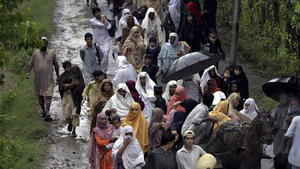DisastersCholera spreads in flood-ravaged Pakistan
With stagnant water throughout Pakistan, water-borne diseases such as gastroenteritis, malaria, and typhoid, now threaten the nation; there are reports of diarrhoea and cholera among the hundreds of thousands left homeless, and food and drinking water are in short supply

Refugees from Pakistani flooding seeking new shelter face additional health threats // Source: cbc.ca
The worst floods in living memory in Pakistan have killed more than 2,000 people and left more than one million stranded or homeless. “Massive devastation has been reported in Swat and Shangla, where link bridges and thousands of houses were washed away,” report the Associated Press of Pakistan.
Wendy Zukerman writes that Pakistan’s climate is dominated by a seasonal wind reversal called the Asiatic monsoon. In late June, the monsoon winds reverse direction — from northeast to southwest — bringing a hot and rainy season which lasts until early October.
Billions of people in the region depend on these monsoon rains for agriculture. Over the past few days, however, the rain has been unrelenting, causing flash floods and landslides.
The Sydney Morning Herald reports that “Pakistan’s weather bureau said the northwest was hit by an ‘unprecedented’ 312mm of rain in the space of 36 hours” (by way of comparison: last year the total rainfall in Pakistan’s northwest during the whole month of July was 210mm). BBC’s Aleem Maqbool in Islamabad, Pakistan reported that “Rivers have burst their banks and entire villages of mudbrick houses have been destroyed.” People have drowned, and “others have been crushed by collapsing buildings or electrocuted,” he wrote.
According to the New York Times, the floods are believed to be the worst in more than eighty years.
With stagnant water throughout Pakistan, water-borne diseases such as gastroenteritis, malaria, and typhoid, now threaten the nation. The BBC says there are reports of diarrhoea and cholera among the hundreds of thousands left homeless, and food and drinking water are in short supply.
The information minister of Khyber-Pakhtoonkhwa (formerly North West Frontier Province) — one of the worst-hit provinces, confirmed reports about an outbreak of cholera in some areas of Swat.
Neighboring Afghanistan has also been affected by the monsoonal rains, with floods killing at least sixty-five people and affecting more than 1,000 families, reports Australia’s Broadcasting Corporation.
